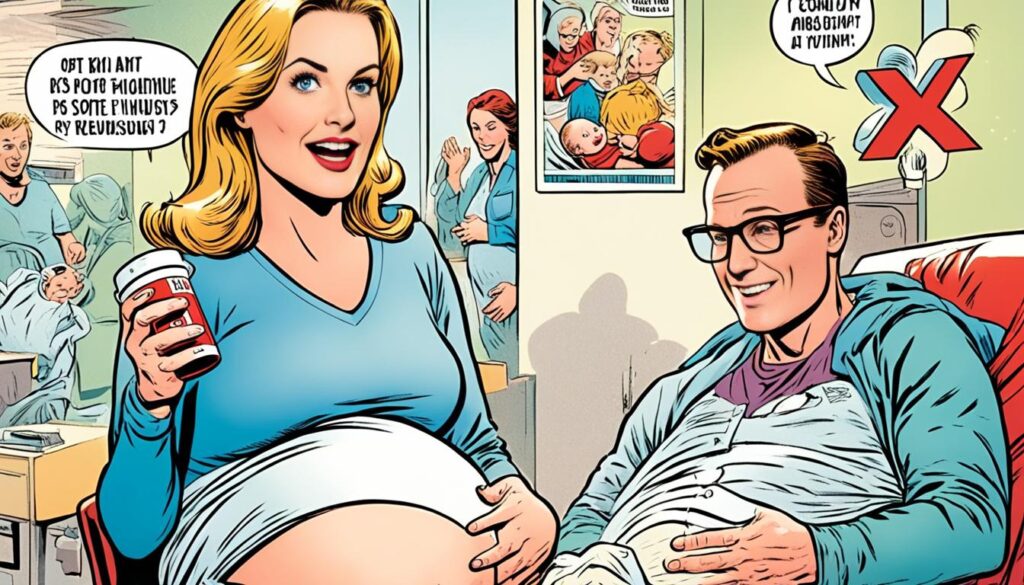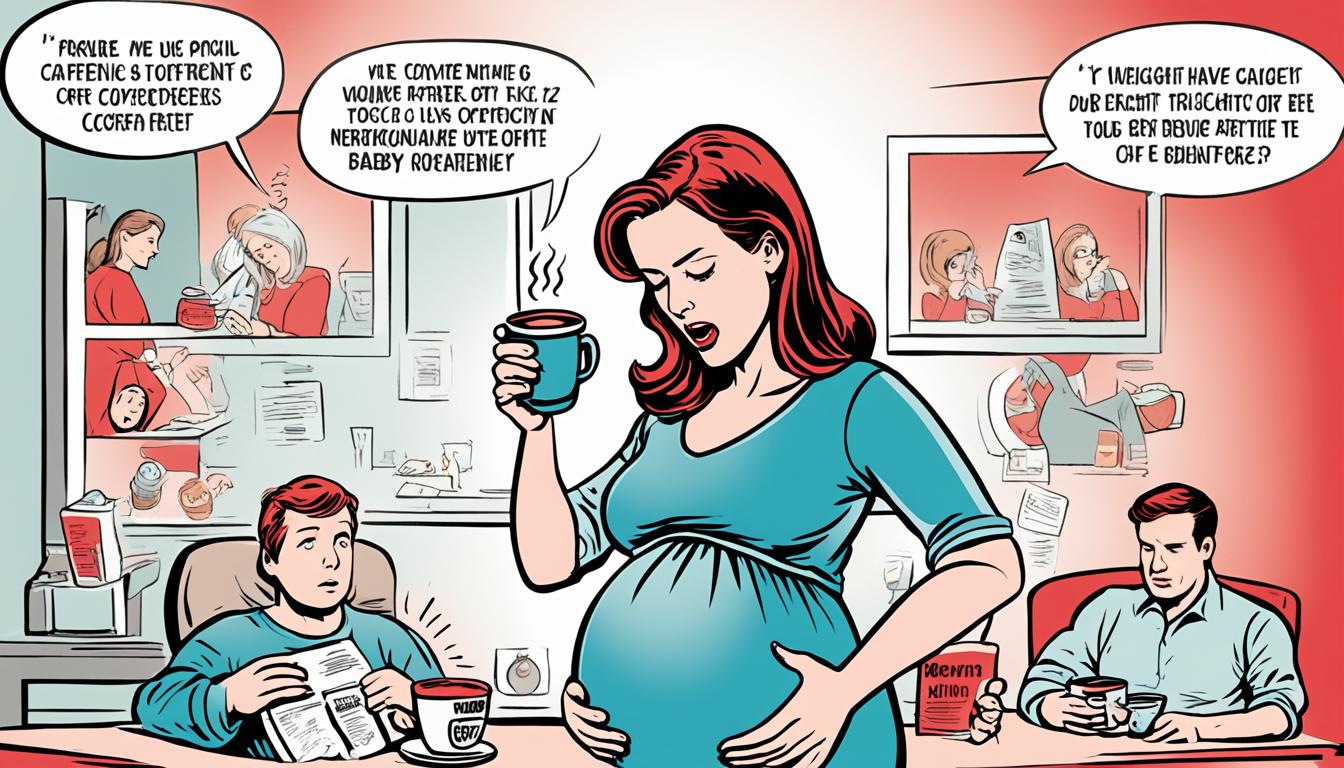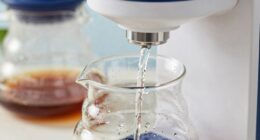Are you aware that consuming excessive amounts of caffeine during pregnancy can pose risks? It can slow down your body’s ability to metabolize caffeine, as it takes 1.5–3.5 times longer to clear it. This sluggish process can have an impact on the baby1. Many expectant mothers are concerned about the safe intake of caffeine. The American College of Obstetricians and Gynecologists (ACOG) recommends keeping it below 200 milligrams per day2.
Staying under 200 mg of caffeine a day while pregnant is safe. It doesn’t lead to miscarriage or early birth1. But, going over 200 mg a day could increase the risk1. Also, having 50–149 mg a day could slightly raise the chance of the baby being born underweight1. It’s key for pregnant ladies to watch their caffeine use. This way, they can lower any dangers to their baby’s well-being.
Key Takeaways:
- Drinking excessive amounts of caffeine during pregnancy can have potential health risks for both the mother and baby.
- Research shows that caffeine is metabolized slower during pregnancy, which raises concerns about its effects on the baby.
- The American College of Obstetricians and Gynecologists (ACOG) advises pregnant women to limit their caffeine intake to less than 200 milligrams per day.
- Consuming less than 200 mg of caffeine per day during pregnancy does not increase the risk of miscarriage or preterm birth.
- Higher caffeine intakes during pregnancy may raise the risk of miscarriage and low birth weight.
The Impact of Caffeine on Pregnancy Loss
Research has looked into how caffeine might affect pregnancy loss. Some findings suggest too much caffeine could increase the chance of miscarriage and stillbirth. It’s key for expectant mothers to know about the risks of drinking caffeine during pregnancy3.
The American College of Obstetricians and Gynecologists suggest a caffeine limit for pregnant women. They recommend no more than 200 milligrams a day3. This is like drinking a 12-ounce cup of coffee. Nursing moms should stick to two cups of coffee per day3. These guidelines help lessen the risks of too much caffeine during pregnancy and breastfeeding3.
High caffeine use during pregnancy could lead to miscarriage, preterm birth, or babies born with low weight3. But, the research isn’t definite. More studies are needed to really understand how caffeine affects pregnancy loss3.
Caffeine isn’t just in coffee. It’s in energy drinks, which can have up to 500 milligrams per 24-ounce serving3. Caffeine is also in guarana, yerba mate, kola nut, and green tea extract. It’s a good idea to check the labels on medications since the FDA requires caffeine amounts to be listed3.
Babies might get fussy or sleep poorly if their breastfeeding moms drink over 2 to 3 cups of coffee a day3. Yet, the American Academy of Pediatrics says a small amount of caffeine is okay for nursing mothers3.
Caffeine Content in Common Beverages
| Beverage | Caffeine Content (mg) |
|---|---|
| Coffee (8 oz) | 95 |
| Tea (8 oz) | 47 |
| Energy Drink (8.4 oz) | 80 |
| Soda (12 oz) | 34 |
| Chocolate Milk (8 oz) | 5 |
Pregnant women should talk to their healthcare provider about caffeine. Caffeine can affect blood pressure, heart rate, and sleep3. By making smart choices, they can lower their risk of losing the pregnancy and have a healthy term.
Effects of Caffeine on Fetal Growth and Birth Weight
Many studies have looked at how caffeine affects a baby’s growth and birth weight. Drinking too much caffeine during pregnancy can increase the risk of the baby growing slowly and being born small4. Researchers have found a clear link between the caffeine a mom drinks and the chance of her baby growing slowly4.
This concern is also supported by the presence of caffeine breakdown products in the baby’s umbilical cord blood. These findings suggest how caffeine could influence the baby’s development while in the womb4. Pregnant women should know these risks and think about drinking less caffeine for their baby’s health.
There’s also proof that caffeine can lead to babies being born with a low weight4. The Journal of Clinical Nutrition shared a study that underscores the need to watch caffeine intake during pregnancy4. Another study revealed that caffeine could affect the intelligence level of children at 5.5 years old4. Biological Psychiatry reported this study, showing lower IQ scores in kids who were exposed to caffeine before birth4.
Apart from the risks of low birth weight and affecting a child’s brain development, pregnant women’s caffeine consumption is linked to obesity in their children4. The International Journal of Obesity shared findings that illustrate the lasting effects of caffeine during pregnancy4. Similarly, a Norwegian study found a connection between a mother’s caffeine intake and her child’s growth and likelihood of becoming overweight4.
Recommended Maximum Caffeine Intake
To avoid risks, pregnant women should know the caffeine limit is 200mg per day during pregnancy and breastfeeding5. Going over this amount can raise the chance of miscarriage or having a baby that is too small5. They should track how much caffeine they consume closely and look for other safe options.
Common Sources of Caffeine
| Beverage/Food | Approximate Caffeine Content |
|---|---|
| Instant coffee | 60-100 mg per cup |
| Fresh coffee | 80-350 mg per cup |
| Decaffeinated coffee | 2-4 mg per cup |
| Tea | 8-90 mg per cup |
| Cola drinks | 35 mg per 250ml serve |
| Cocoa and hot chocolate | 10-70 mg per cup |
Source: Statistical data from link 2
Besides coffee and tea, cola, cocoa, and hot chocolate are common caffeine sources5. Pregnant women should watch their caffeine intake and possibly choose decaffeinated or caffeine-free options.
Some medicines, both prescription and over-the-counter, may also contain caffeine, from 20 to 100 mg per dose5. It’s important for pregnant women to check medicine labels and talk to healthcare providers to be aware of any caffeine in medications.
Knowing how caffeine affects unborn babies and their birth weight is very important for pregnant women. Reducing caffeine and choosing healthier drinks can help ensure a safe pregnancy and the health of both mom and child.

Caffeine and Preterm Birth
The topic of caffeine during pregnancy is often talked about. It’s about whether drinking caffeine can lead to having a baby too early. Various studies have looked into this, trying to understand if caffeine affects when a baby is born.
Studies tell us that if you have less than 200 mg of caffeine a day, it’s probably okay6. But, having a lot of caffeine might make the risks higher6. So, it’s good for pregnant people to think about drinking less caffeine to lower the chance of having their baby early.
Researchers have tried to find out more about caffeine and early births. They looked at a lot of studies and found some numbers that show there might be a higher risk if you drink a lot of caffeine7. But, the results vary, showing us that we don’t know everything yet7.
About 12-13% of babies in the United States and 5-9% in Europe are born too soon7. But, we’re still figuring out how much caffeine might affect this.
| Caffeine Intake (mg/day) | Odds Ratio (OR) for IUGR |
|---|---|
| 100–199 | 1.26 |
| 200–299 | 1.56 |
| 300+ | 1.46 |
There’s been research on caffeine and how it might affect a baby’s growth before birth. Some studies don’t see a clear link6. Yet, others show that the more caffeine someone has, the bigger the risk might be, with numbers from 1.2 to 1.56. Although these studies suggest a possible link, nothing is certain yet6.
We need to do more studies to really understand how caffeine affects pregnancy outcomes like early birth. Both doctors and those who are pregnant should know about these risks. They should make choices based on what they learn.

Key Takeaways:
- Moderate caffeine intake (less than 200 mg per day) doesn’t majorly increase the risk of early birth6.
- Too much caffeine could lead to a higher chance of having a baby early6.
- We still need more research to understand the link between caffeine and early births fully7.
- Early births happen quite a bit, affecting 12-13% of babies in the United States and 5-9% in Europe7.
- When it comes to caffeine and a baby’s growth before birth, the findings are not the same everywhere, and we can’t say for sure if caffeine is a risk6.
Caffeine and Neurodevelopmental Effects on the Child
Research is ongoing about how moms’ caffeine intake during pregnancy affects their kids’ brains. Studies have looked at how it may relate to kids’ IQ, behavior issues, and ADHD.
A 2016 study by Galéra et al. showed that caffeine while pregnant might affect a child’s IQ at age 5.5. They explored how caffeine consumption by the mom might impact the child’s brain development.
Del-Ponte et al. in 2016 found a link between prenatal caffeine and ADHD in 11-year-olds. This suggests that caffeine in pregnancy could increase ADHD risks in kids.
Research by Klebanoff and Keim in 2015 connected moms’ caffeine intake to their kids’ cognition and behavior at ages 4 and 7.
But, understanding the link between prenatal caffeine and child brain development needs more work. More studies are needed to clarify these effects and the long-term outcomes.
It’s also important to remember that caffeine’s impact isn’t just from pregnancy. Childhood caffeine use and genetic differences in processing caffeine can affect brain development too.
The Role of Caffeine in Childhood Obesity and Growth
Too much caffeine during pregnancy is tied to a higher chance of childhood obesity. A study in 2017 by Hvolgaard Mikkelsen and colleagues linked it to an increased risk of behavioral issues and obesity in children. To further understand the impact of caffeine on pregnancy, researchers have also studied the caffeine levels in various coffee types. They found that the amount of caffeine can vary widely depending on the type of coffee and the method of preparation. This suggests that pregnant women should be mindful of their caffeine intake, not only from coffee but also from other sources such as tea, energy drinks, and chocolate.
Yet, not all research links prenatal caffeine to childhood obesity. Linnet et al. in 2009 found a relationship between coffee during pregnancy and ADHD, but not obesity.
The effect of caffeine on child growth is influenced by many factors. Genetics, diet, and lifestyle all play a role, making it hard to single out caffeine’s impact.
Recommendations for Pregnant Women
Pregnant women should watch their caffeine intake. The American College of Obstetricians and Gynecologists suggests staying under 200 milligrams a day. The Swedish National Food Agency recommends less than 300 milligrams.
Expecting moms might want to try herbal teas or decaf instead. Monitoring all dietary caffeine can help ensure healthy baby brain development and lower obesity risks.
Talking to healthcare providers about caffeine and following their advice is crucial. This helps ensure a healthy pregnancy and the best start for babies in terms of brain development and growth.
| Statistical Data | Reference |
|---|---|
| Prenatal exposure to caffeine was associated with child IQ at age 5.5 years. | 8 |
| Caffeine consumption during pregnancy was linked to ADHD at the age of 11 years. | 8 |
| Maternal caffeine intake during pregnancy was associated with child cognition and behavior at 4 and 7 years of age. | 8 |
| Coffee consumption during pregnancy was correlated with the risk of hyperkinetic disorder and ADHD in children. | 8 |
| Studies suggest a link between maternal caffeine consumption during pregnancy and behavioral disorders and childhood obesity. | 89, |
| Limiting caffeine intake during pregnancy can help promote optimal neurodevelopment and reduce the risk of childhood obesity. | 9 |
Individual Differences in Caffeine Metabolism and Genetics
How our bodies handle caffeine can be different for each person. This is because of our genes. For pregnant women, knowing how your body processes caffeine is vital.
Some of us may feel the effects of caffeine more than others. Or, our bodies might break down caffeine faster. This can affect how caffeine impacts our bodies, especially during pregnancy.
In 2014, research suggested that caffeine during pregnancy could lead to problems at birth10. A study in Uruguay in 2006 also hinted at a link between caffeine and the risk of losing a baby10. These studies show why we need to understand how different bodies react to caffeine.
A 2021 study found that caffeine could also affect how babies grow before birth10. This means how a mom metabolizes caffeine could impact her baby’s development.
Data from 2014 showed that caffeine could cause birth problems10. And in 2015, a study linked caffeine to a higher chance of miscarriage10. These findings stress the need to think about how caffeine affects each of us differently during pregnancy.
Every pregnant woman processes caffeine in her own way11. A study showed many exceeded the daily caffeine limit in the first trimester. It’s important for moms-to-be to know their caffeine metabolism to stay within safe limits.
Because our genes affect how we metabolize caffeine, pregnant women should be cautious. A 2013 study linked caffeine to baby’s weight but not how long the pregnancy lasted12. And in 2008, research suggested a risk of the baby not growing as it should because of caffeine12.
Individual Differences in Caffeine Metabolism and Pregnancy Risks
Knowing that caffeine affects everyone differently is key for pregnant women. They should talk to their doctors about caffeine. This includes all caffeine sources like coffee and soda. Research shows that caffeine can affect pregnancy and requires careful thought12.
Understanding how our genes affect caffeine processing might help with personalized advice for pregnant women. Bunker and McWilliams’ study in 1979 showed how much caffeine is in drinks. It highlights the role of genetics in caffeine metabolism12.
In summary, caffeine’s effect during pregnancy depends on individual metabolism and genetics. Pregnant women need to consider their caffeine metabolism. They should seek advice from health experts and check their caffeine intake against current research and guidance. Taking these steps can help protect the health of the mother and her baby.
Conclusion
Taking too much caffeine during pregnancy can be risky for both mom and baby. It’s smart to be careful and maybe cut back on caffeine. High caffeine levels can be harmful. One case showed that taking 4000mg of caffeine was dangerous13.
Some studies link too much caffeine with higher chances of miscarriage, stillbirth, and other health issues for the child14. Caffeine gets into the body fast and starts working in about 15 minutes13. The most effect is felt between 15-45 minutes after drinking it13.
Even though not all studies agree, pregnant women should talk to doctors about caffeine. This helps them consider their unique health and the baby’s needs13. Making health a priority helps in making smart choices about caffeine.
Some research connects caffeine with kids being overweight, but the evidence isn’t clear yet14.
In short, pregnant women should be cautious with caffeine. With their doctors’ advice, they can choose what’s best for their health and their baby’s.









